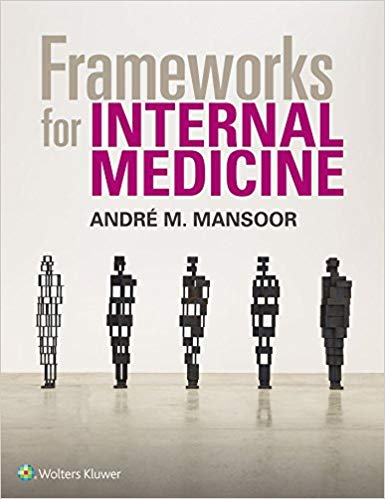Frameworks for Internal Medicine (2018) is a very popular 768-page book which lays out a fairly detailed algorithmic approach to internal medicine. It is a single author book, which is a very rare accomplishment for an author of a book of this size and scope. The book employs mainly two teaching methods: the algorithmic approach and the Socratic method.
The algorithmic approach
In support of the algorithmic approach to teaching internal medicine, the author posits the following as an example:
It has long been established that iron deficiency anemia is associated with decreased mean corpuscular volume (MCV) of red blood cells; this is not debatable or controversial. Based on MCV, a construct can be designed to approach anemia. Foundation of medical knowledge should be built using these reliable principles.
Frameworks for Internal Medicine (2018, page 688, emphasis supplied)
I agree with the author to the extent that an algorithmic approach can help learners organize and retain information. However, the approach can also lead to detrimental clinical habits and practices which some early learners might never outgrow—and that needs to be part of the discussion as well.
Take the author’s MCV example from above. The author correctly notes (page 317) that chronic inflammation, acute blood loss and hemolysis are commonly associated with normocytic anemia. However, poor nutrition commonly leads to B12 or folate deficiency in addition to iron deficiency. In such instances, the microcytic “forces” will cancel out the macrocytic “forces” and the result can be a normocytic anemia that will escape detection if a conventional algorithm is applied. In other words, failing to check iron studies, B12, and folate in patients with normocytic anemia in appropriate settings can lead to highly consequential delays in diagnosis and treatment, particularly in the most malnourish patients. See, for example, Classification of anemia for gastroenterologists, World J Gastroenterol. 2009 Oct 7; 15(37): 4627–4637. Published online 2009 Oct 7. doi: 10.3748/wjg.15.4627 (“Nutritional mixed anemia that combines deficiency of vitamin B12, folic acid and iron is frequent. In consequence, these three parameters should be requested in the initial phase of the diagnosis of normochromic anemia“) (emphasis supplied).
Again, I’m not advocating for the abandonment of the algorithmic approach to internal medicine altogether. It has its place in medical teaching, particularly that of early learners. However, the algorithmic approach is a tool like any other and, as such, learners must be reminded of its limitations. In this particular example, learners need to be reminded of the fact that MVC classification is not a reliable way to exclude iron, B12 or folate deficiency, particularly in poorly nourished patients. I hope that future editions will emphasize this and similar points.

The Socratic Method
The argument in favor of using the Socratic method is more persuasive in my view. As the author notes:
This book preserves the art of Socratic teaching: a method that reaches back 2,500 years. Not only does the process reveal what is known but, even more clearly, it reveals what is not known…. It is a powerful thing to witness.
Frameworks for Internal Medicine (2018, page vi)
What makes the Socratic Method so effective? ( ← See what I did there?)
The Socratic Method transforms passive learning into active learning. In addition, and probably more importantly, when used in group settings, it encourages learners to take a public position on an issue, that is, to have skin in the game. Publication, even if only verbally and among your peers, makes you emotionally invested in your response in particular, and in learning more generally.
That said, many learners absolutely detest being put on the spot, particularly publicly, by a barrage of often-tangential questions. However, a distinction has been made in the literature between the constructive use of the Socratic Method versus attempting to “belittle the learner without fostering intellectual curiosity,” a practice which should, of course, be avoided. To employ the Socratic method effectively in more public settings, one should ask only relevant questions that are appropriate for the learner’s learning level. In addition, the questions should be used as discussions starters rather than as substitutes for a barrages of artillery fire.
Unfortunately, there are very few books that teach medicine Socratically. Surgical Recall (2017), which I’ve reviewed elsewhere, is one such book. And while Frameworks for Internal Medicine (2018) is far more detailed than its surgical analog, the two books can be used together as very powerful medicine and surgery teaching tools.
Participation question
What is your favorite differential diagnosis book and why?


Leave a Reply